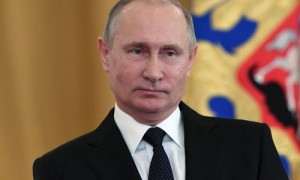The country has policy tools in place to anchor the economy if "it slides below the appropriate range", he told a news conference.
Li said there is still ample room for investment to boost the economy — in the underdeveloped central and western regions, for example.
New growth engines will be cultivated to make up for the weakening role of traditional sectors in contributing to economic growth, he said.
"We will develop 'the new economy' — that is, we will foster new growth engines to help promote economic restructuring."
These new engines include not only emerging industries such as the Internet, the Internet of Things, cloud computing and e-commerce, but also state-of-the-art manufacturing, such as intelligent manufacturing and customized production, the premier said.
Traditional growth engines tend to weaken as an economy matures, which has happened in many countries, especially developed ones. this calls for new emerging industries, together with traditional sectors, to promote economic growth, he said.
China has seen an economic slowdown in the first two months of the year as growth in both industrial production and retail sales dipped.
Uncertainties in global markets, such as weak demand and financial market volatility caused by interest rate decisions taken by the US Federal Reserve this year, have also added pressure on China.
"The Chinese economy still has a lot of potential (for growth)," Li said. "There will be no hard-landing as long as the reforms continue."
China has decided to launch supply-side reform — an initiative to lower barriers to production through such measures as tax cuts and shedding overcapacity — to stimulate economic vitality.
The country will not falter in carrying out its reform agenda while ensuring that growth is not seriously affected, Li said. "One thing is for sure — we are determined to push ahead with our reform agenda."
He said the authorities will also step up financial supervision through better coordination between departments to ward off risks presented by the many innovative financial products on the market and the interconnection of different financial sectors.
"We need to reform and improve our financial regulatory system, and we will strengthen coordination (among different regulatory bodies)," he said.
China has reduced interest rates and banks' reserve requirement ratio to increase liquidity and lower the costs of production to boost the economy after GDP grew by 6.9 percent last year, the slowest pace since 1990.
Li said these decisions were taken to lower the financing costs of enterprises, and were not monetary easing.
Liang Haiming, a senior economist at Pangoal, a think tank in Beijing, said: "China's monetary policy is generally adjusted flexibly in line with the development of the economy.
"Such flexibility can ensure ample capital for supporting the economy, increasing jobs and promoting people's well-being.
"Its monetary stance will not be ultra-loose."
China has set a GDP growth target of 6.5 to 7 percent for this year.
It plans to raise the deficit to GDP ratio to 3 percent this year, compared with 2.4 percent last year.
Wang Tao, chief China economist at UBS, said in a research report that the country is expected to increase investment in infrastructure, services and strategic new industries while pushing structural reforms, such as lowering restrictions on market entrance, to support stable growth this year.
Thanks to China's improving economic activity, investment and industrial production may rebound in the short term, she said.
Cross-Straits relations
Last year, I made a field trip to Fujian province, where I had a round-table (discussion) with some Taiwan businesspeople. Many of them were quite sensitive about any economic measures from the mainland and some were considering whether the preferential policy for Taiwan businesses would be changed. Their point was well taken, and we quickly issued a document specifying that all the preferential policies introduced for Taiwan businesses will remain unchanged, to reassure them. Why did we do that? Because we are all members of a big family. We will introduce more policies to boost business cooperation between the mainland and Taiwan on the premise that there will be continued peaceful development of cross-Straits relations, and the footstone of this is the 1992 Consensus.
Price of agricultural products
The average (grain) price in China is about 600 yuan ($92) per ton higher than the international price. This is mainly because our labor productivity is still quite low. So, in the future, we are going to pursue coordinated development between a new type of urbanization and agricultural modernization to help more migrant people move into urban areas. Those who are already working and living in urban areas will be granted urban residency if they meet certain eligibilities and requirements. And that is also one of the ways to boost their income. We will also develop scaled farming ... to boost labor productivity and enhance the competitiveness of our agricultural products. All in all, we will continue to give very high priority to all issues related to agriculture, farmers and rural areas. And we will also pay very high attention to protecting the lawful interests of workers in the industrial sector.
China-Japan-ROK leaders' meeting
This meeting should have been an annual event. However, it was only resumed last year after a three-year hiatus, and this did not come easily. As to whether the format will enjoy smooth development in the future, it's very much up to the interactions among the three countries. In particular, there have been some signs of improvement in Sino-Japanese ties, but they are not fully established yet and are still fragile. We believe that it is important to adhere to the consensus reached between the two sides on the issue of principle involving history, and it is important to match one's words with concrete actions.
Future of Hong Kong
The development of Hong Kong is needed by Hong Kong itself and also the country as a whole. Hong Kong's development ultimately comes down to the efforts made by the people in Hong Kong. As an advanced economy, Hong Kong achieved (GDP) growth of 2.4 percent last year, which is not low at all. Hong Kong can further use its own strength and also seize the opportunity offered by mainland development. The central government will give full support to any proposal from the SAR government that helps maintain Hong Kong's long-term stability and prosperity and contributes to the well-being of people in Hong Kong. I have confidence in a bright future for Hong Kong.
China-Russia ties
China-Russia relations will not be affected by changing circumstances in the international environment and will not cave in to third-party pressure. In the meantime, China follows the principle of nonalignment, and China-Russia cooperation will not be targeted at any third party.
Cultural relics protection
The preservation of cultural relics is (aimed at) boosting cultural development in our country, enhancing our moral strength and passing on our traditional culture. It will also help us achieve balanced economic and social development for the many problems that have occurred in our economic domain, such as cheating, swindling in the marketplace, selling fake goods, or loss of good faith. One may also try to find the causes behind those problems on a cultural level and make “cultural prescriptions”. The market economy is an economy on the basis of the rule of law with moral principles. So, developing culture will help us enhance moral strength in the course of pursuing modernization. We should not only work hard to create rich material wealth, but also meet our people's growing cultural needs and win the respect of other countries with the strength of culture and civilization.







